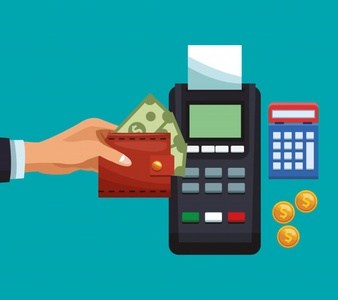
To understand the cashless policy, we need first to understand what a cashless society is. A cashless society refers to an economic state whereby all forms of financial transactions are carried out through the transfer of digital information and not through the exchange of real money or any notes or coins. All sorts of financial transactions are carried out on an electronic format. To achieve this, the use of electronic cards or devices by both parties, suited for those purposes.
The Nigerian Cashless policy (Cash-less Nigeria) introduced in 2012, in an attempt to curb excesses in the handling of cash in the Nigerian system. According to the Cash-less Nigeria policy, the CBN stipulated cash handling charge on daily cash withdrawals that exceed N500,000 for Individuals and N3,000,000 for Corporate bodies. The main aim of this policy was not to eliminate the presence of physical cash in the economy, but to reduce the amount of physical money (coins and notes) circulating in the marketplace, and encourage more electronic-based transactions (payments for goods, services, transfers, etc.)
REASONS FOR INTRODUCING THE CASHLESS POLICY
The Cashless policy introduced for several critical ideas, including:
1. To drive the development and modernisation of our payment system in line with Nigeria’s vision 2020 goal of being amongst the top 20 economies by the year 2020. An efficient and modern payment system is positively correlated with economic development and is a crucial enabler for economic growth.
2. To reduce the cost of banking services (including the cost of credit) and drive financial inclusion by providing more efficient transaction options and greater reach.
3. To improve the effectiveness of monetary policy in managing inflation and driving economic growth.
Also, the cash policy aims to curb some of the negative consequences associated with the high usage of physical cash in the economy, including:
The high cost of money: There is a high cost of funds along the value chain – from the CBN & the banks, to corporations and traders; everyone bears the high costs associated with volume cash handling.
High risk of using cash: Cash encourages robberies and other cash-related crimes. It also can lead to financial loss in the case of fire and flooding incidents.
High subsidy: CBN analysis showed that only 10percent of daily banking transactions are above 150k, but the 10 per cent accounts for the majority of the high-value transactions. It suggests that the entire banking population subsidises the costs that the tiny minority 10percent incur in terms of high cash usage.
Informal Economy: High cash usage results in a lot of money outside the formal economy, thus limiting the effectiveness of monetary policy in managing inflation and encouraging economic growth.
Inefficiency & Corruption: High cash usage enables corruption, leakages and money laundering, amongst other cash-related fraudulent activities.
Content of the Cash policy
Starting from January 1st 2012, a few aspects of the cashless system got implemented in Lagos State (tagged Cash-less Lagos), these looks such as:
1. CIT licensed companies were permitted to provide cash pick-up services.
2. 3rd party cheques above N150,000 were not eligible for encashment over the counter, and value for such cheques shall go through the clearinghouse.
However, the CBN has recently also implemented a 3 per cent processing fee on withdrawals and a 2 per cent for deposits of amounts above N500,000 for individual accounts. The development was made known in a circular signed by the Director, Payments System Management Department at the CBN, Sam Okojere.
Similarly, corporate accounts will attract 5 per cent processing fees for withdrawals and 3 per cent processing fee for lodgments of amounts above N3 million. The statement further stated that the new charges would be in addition to existing charges on withdrawal, as stated earlier.
EXPECTED OUTCOME OF THE POLICY
The CBN hopes to achieve a wide range of benefit from the implementation of this policy. Some of these benefits are:
FOR CONSUMERS:
1. The introduction of the Cash-less Nigeria policy would bring about increased convenience in carrying out business transactions.
2. The introduction of this policy will also bring about more service options.
3. Less cash in the hands of individuals means there would be less cash-related crimes, thereby reducing criminal activities.
4. It is expected to bring about cheaper access to banking services. Banking services would be carried out electronically without having to employ the services of the bank.
5. To access credit and financial inclusion. Individuals and businesses have access to useful and affordable financial products and services that meet their needs that are delivered responsibly and sustainably. They have better opportunities to access financial services.
FOR CORPORATIONS:
1. The introduction of this policy would enhance faster access to capital for corporations. Hence, organisations/companies can raise money electronically without having to go physically to the bank.
2. Reduced revenue leakage ( unnoticed or unintended loss of revenue from a business). With the Cash-less policy, companies will have more accurate billing systems and better management.
3. Reduced cash handling cost. With the cashless system, the cost of handling cash drops.
FOR GOVERNMENT
1. Increased tax collection.
2. Greater financial inclusion. With the introduction of this policy, the government can provide individuals and businesses with access to useful and affordable financial products and services that meet their needs and are delivered responsibly and sustainably.
3. Increased economic development. The Cashless policy would generally bring about economic growth in the country.
The cashless policy is not as bad as is being portrayed. The positives outweigh the negatives, and with time, Nigerians stand more to benefit from the system.
The policy places Nigeria as one of many countries, making an excellent effort to be on par with leading economies. The age of digitalisation is upon us and with it comes smarter ways to collate data for analysis to measure the performance of the economy. Understanding the strengths and weaknesses of the economy will introduce better policies that can serve the people right. It presents a new wave of convenience, long queues, other expenses that arise with the traditional banking system.
However, the positives of the policy may go unnoticed if other stages are not reviewed and implemented to serve society better. In addition to the need for proper implementation, adequate security measures need to be in place to forestall fraudulent practices.
You may be interested

AFCON 2025Q: New Boy Osho, Iheanacho, Start For Super Eagles Vs Benin Republic
Webby - November 14, 2024The Super Eagles will line-up in a 3-4-3 formation in tonight’s 2025 Africa Cup of Nations qualifying tie against Benin…

My Goal Was To Achieve Success With Ten Hag At Man United –De Ligt
Webby - November 14, 2024Netherlands international Matthijs de Ligt has suggested Erik ten Hag didn’t get the breaks he needed to keep his job…

I Want To Take My Game To New Level –Lookman
Webby - November 13, 2024Super Eagles winger Ademola Lookman has reiterated his commitment to take his game to the next level.The Nigerian international, who…






















![American Pastor, David Wilson Seen Eating The Box Of Woman Who Isn’t His Wife [Video]](https://onlinenigeria.com/wp-content/uploads/2019/10/american-pastor-david-wilson-seen-eating-the-box-of-woman-who-isnt-his-wife-video-150x150.jpg)








